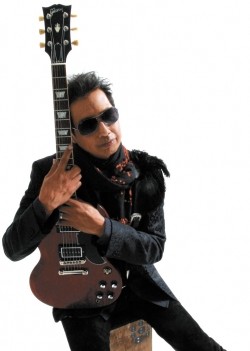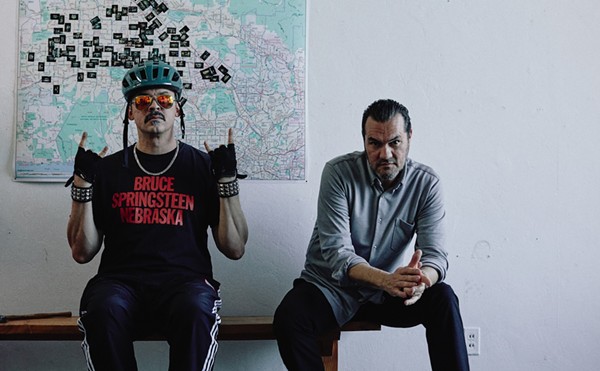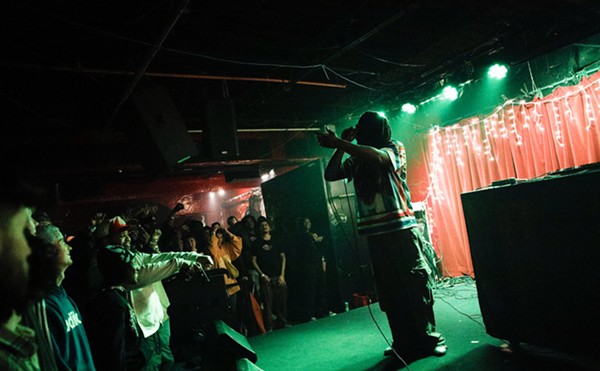Veteran Austin-based singer-guitarist Alejandro Escovedo has persevered through three decades of rough-and-tumble rock 'n' roll and lived to make an album about it. He's seen his ballyhooed punk / garage bands the Nuns, Rank and File, and the True Believers come and go. He's also eluded death after a really bad bout with hepatitis. All the while, he's delivered one stellar album after another but hasn't had anything resembling a hit.
Real Animal, his ninth solo effort, could change all that. Produced by Tony Visconti (David Bowie, T. Rex, Thin Lizzy), it starts with the rollicking "Always a Friend," a confessional rocker that has Springsteen overtones (and The Boss has even covered the tune), and doesn't let up. But unlike other albums, Real Animal has netted Escovedo more attention than any record in his storied career.
From the outside looking in, you could say the guy is finally getting his due after 30-plus years in the business. Springsteen's manager Jon Landau is now Escovedo's manager, and this past summer, he joined Springsteen onstage for "Always a Friend." Escovedo also played in front of some of the biggest audiences of his life, opening for the Dave Matthews Band on several dates of its summer shed tour. But the soft-spoken Escovedo refrains from celebrating his recent, well-deserved success.
"I don't think of it like that," he says via phone from his home when asked if he's finally broken through. "I feel like I've gotten my due years ago. For me, the fact that we were a band that was sometimes great, sometimes good and sometimes not so good wasn't important. What was important was that we were a band trying to make music that was different. We never faltered from that vision. We never swayed from that lifestyle. We wanted to be musicians. We wanted to play hard. We wanted to play well. To be able to do that all your life, for 33 years, is incredible. Not that many people can say that."
But being discovered by new audiences has its drawbacks, he says. "With that comes a lot more scrutiny too," he says. "You're suddenly exposed to more journalists on a different level, who don't necessarily want to covet you as a cult thing. They want to get to an essence of who you are or are not. Because of the exposure, certain journalists want to scrutinize everything that I do on a different level with more intensity." And what was it like performing with the man they call the Boss?
"It happened as a complete surprise," says Escovedo, who explains that he was heading to Houston to catch Springsteen's show when he got a text message that read, "Bruce wants to know if you're in." As soon as he got to the venue, Escovedo ran through the tune quickly in the dressing room with Springsteen, who had already taught the E Street Band the song. And then it was off to play in front of an audience of 18,000.
"I love surfing, and it was like dropping into a 30-foot wave," says Escovedo. "It's a commitment. Once you're in, I did not want to falter. I was trying to hang on for dear life. He was extremely generous. I feel very honored that he did that."
And seeing that Escovedo comes from a garage-rock and punk tradition, it might seem a little strange that he was paired with a jam-band like the Dave Matthews Band. But for Escovedo, the opportunity to play before large audiences was worthwhile. And Matthews, who's known to be a fan and supporter of a wide array of music, was a gracious host, says Escovedo.
"It was great," he says. "Here's another great gentleman. He treated us with tremendous respect. I don't know that his audience loved us. I don't know that we cross over audiences. It was weird, but it was cool because we were thrust into this new arena. We were suddenly put on this level of performing in front of, on the average, 18,000 people a night. It was a whole new ballgame. We played clubs for 33 years. I always think the more intimate, the better. I think it's better if there's only five people there. But he treated us super well and he was great. I loved listening to him every night. I learned a lot."
While Escovedo has been experimenting more and more with a backing orchestra, he really gets the most out of the string section on songs like the noisy "Chelsea Hotel '78," which revisits the time of his life when he took up residence at the famous N.Y.C. institution.
"It was quite an important moment in my life," he says of his time at the mythical hotel. "First of all, it represented everything about bohemian lifestyle in New York. It was where all the great writers and musicians lived. Patti Smith and Sam Shepard were there. And because I lived there, it was a very pivotal moment."
The song provides a cinematic quality to Real Animal, something he says was achieved with co-writer Chuck Prophet.
"He brings a screenwriter's journalistic eye for detail," says Escovedo. "He sharpens the image a lot more than I do. With that, it became this street journalism. I love the way we depicted the whole thing. It plays out like a short film. It was important for me. The Chelsea represented bohemian lifestyle. I lived there after the [punk band] Nuns left. I still stayed there and met a bunch of people there. It was cool."
On Real Animals, the orchestra really clicks too. It chisels away on "Smoke," interacting nicely with the guitars for a mid-song jam. Every Escovedo album seems to have one centerpiece, and this one's no different. On "Golden Bear," which starts out sounding like an old David Bowie tune, Escovedo writes openly about his illness, referring to it as "the creature in my body." It's a brilliant, haunting tune, right up there with classic Escovedo attacks like "The End." But it also shows just how far Real Animal has swung from its predecessor, the more subdued and eloquent Boxing Mirror, which came out in 2006.
"Real Animal, to me, seems different from Boxing Mirror," says Escovedo. "That started a new phase of songwriting for me, but because it came in the aftermath of dealing with an illness for a few years, it's a reflective record on death and loss. Real Animal is more of a life-affirming record. I think getting healthier had a lot to do with it. And also wanting to separate myself from that past, because it was over with, as far as I was concerned. I didn't want to make another record that was a meditation on loss and suffering. I think, more importantly, that's what I was trying to get away from."













